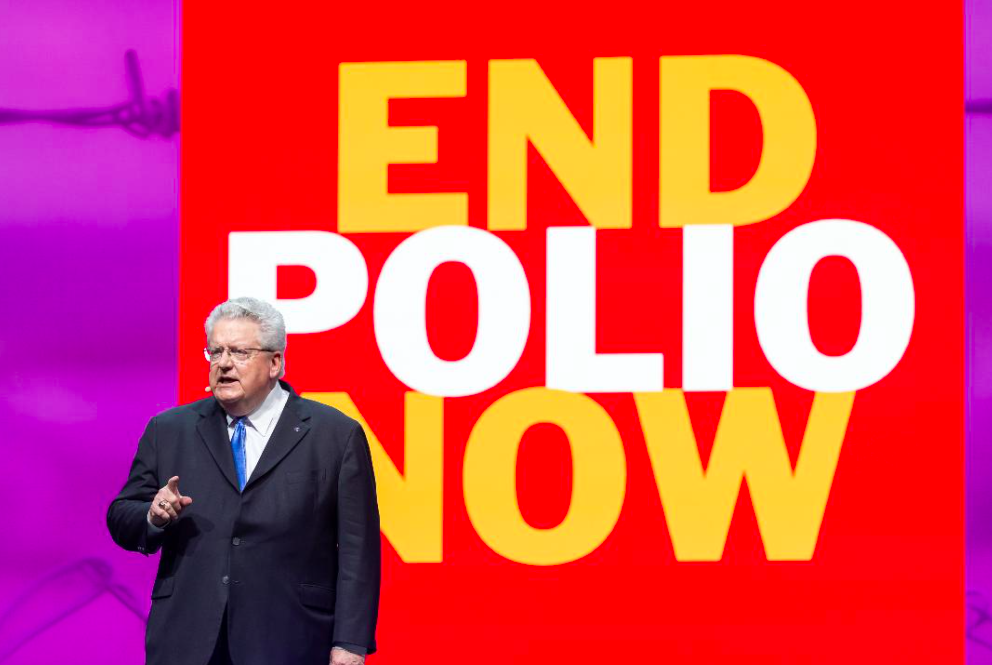Rotary International Trustee Chair Mark Maloney.
The global ambition to eradicate
polio, once seemingly within reach, confronts an array of formidable challenges
ranging from geopolitical instability and funding gaps to outbreaks in regions
previously declared polio-free.
In a decisive move to counter these
escalating threats and inject renewed vigor into the final stages of
eradication, Rotary and the Gates Foundation today announced a substantial
joint commitment of up to US$450 million for global polio eradication efforts.
The pledge was revealed at the annual
Rotary International Convention in Calgary, reaffirming a long-standing
partnership now more critical than ever.
This renewed financial commitment
signals an urgent recognition by leading philanthropic and humanitarian
organizations that despite remarkable progress, the path to zero polio cases is
increasingly complex and demands sustained, strategic investment.
“While historic
progress has been made toward defeating polio, 90 percent of the world’s
population is free from the wild poliovirus, we’re facing significant
challenges from competing financial priorities to fragile health systems,” stated Mike McGovern,
Rotary International PolioPlus Committee Chair.
“Furthermore, the detection of polio in places like Papua New Guinea that
were previously polio-free demonstrates that polio anywhere is a threat
everywhere.”
He believes that the extension of the fundraising partnership with the Gates
Foundation allows Rotary to reach children around the world with lifesaving
vaccines, keeping every child and community safe from this preventable disease.
Under the renewed agreement, Rotary
will continue its dedicated fundraising, aiming for $50 million per year.
Every dollar raised by Rotary will be matched
with two additional dollars from the Gates Foundation, collectively providing
up to $450 million over three years to support the
Global Polio Eradication Initiative (GPEI).
“Rotary was the first
to envision a world without polio—and today, we have the tools and knowledge to
make that vision a reality,” said Bill Gates, Chair of the Gates Foundation.
“If we all maintain our commitment and keep funding the solutions we know work,
then soon, no family will have to live in fear of this horrific disease ever
again.”
These vital funds will be
deployed to support a comprehensive array of activities, from crucial vaccine
delivery and enhanced surveillance to robust community engagement and the
sustained implementation of polio eradication programs in the remaining
affected regions.
A particular focus will remain on
Afghanistan and Pakistan, the two nations that continue to report cases of wild
poliovirus. The funding also enables Rotary to provide emergency response for
polio outbreaks, exemplified by the US$500,000 committed in late 2024 to
support a two-round polio vaccination campaign in Gaza following a confirmed
case of a 10-month-old child who was diagnosed with polio.
Polio, a paralysing and sometimes
deadly disease, is on the verge of becoming only the second human disease in
history to be eradicated. This critical funding infusion ensures that efforts
to protect children in at-risk countries continue with the necessary resources.
“For 40 years Rotary
has remained steadfast in our commitment to ending polio for good, and the
Gates Foundation partnership renewal underscores the
importance of this effort,” said Rotary International President Stephanie
Urchick. “With gratitude to the Gates Foundation, we remain resolute in
delivering on our promise of a polio-free world.”
Rotary has been at the forefront
of polio eradication since launching its PolioPlus program in 1985,
contributing over US$2.9 billion and countless volunteer hours. In 1988,
Rotary, alongside the World Health Organization (WHO), UNICEF, and the U.S.
Centers for Disease Control and Prevention (CDC), co-founded the GPEI.
This partnership was later joined by
the Gates Foundation and Gavi, the Vaccine Alliance. From an annual incidence
of 350,000 cases at the GPEI’s launch, coordinated global efforts, supported by
world governments like Canada, which has pledged over CAD$1 billion to the GPEI
to date, have dramatically reduced cases by more than 99.9 percent.


